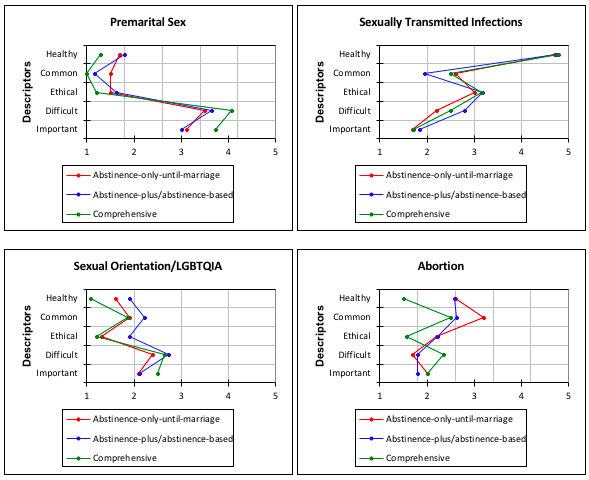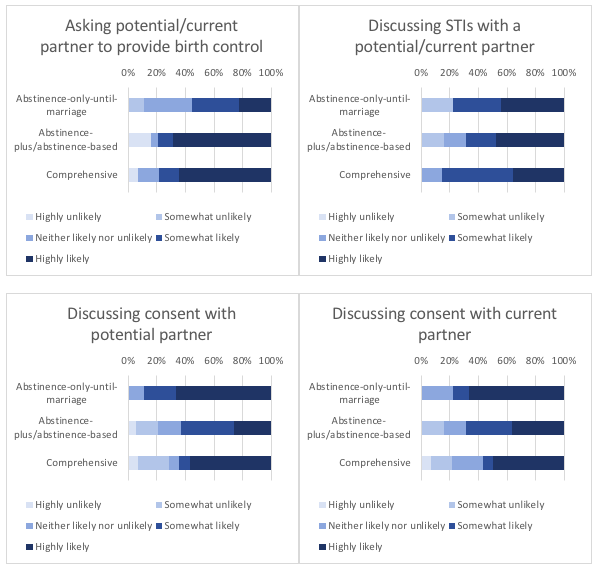Research Brief
As the culmination of my Community Health Research course in Vanderbilt’s Anthropology department, I successfully proposed and conducted an IRB-approved survey-based study correlating young adults’ sexual attitudes and behaviors with their sex education experiences. My full survey analysis included quantitative and qualitative data from 53 participants, all of whom were recruited through Reddit.
The findings and analyses presented in my research brief are excerpted from the full-length paper. The brief is included below, and a formatted PDF version can be found here: Research Brief (PDF). The full survey instrument is included in the Appendix of the PDF version.
Correlating Young Adults’ Sexual Attitudes and Behaviors with Their Sex Education Programming
The overwhelming majority of research on sex education focuses on outcomes of students’ sexual activity (i.e., rates of teen pregnancy or STIs). By conducting an online survey of young adults in their mid-20s about their sex education experiences and current perspectives, this study instead seeks to better understand whether young adults’ behaviors and attitudes correlate with the education they received as teenagers. Findings suggest little to no difference between survey participants from different educational backgrounds, but a consistent desire among participants to close gaps between what they learned in class and what knowledge is important to them now.
Why Young Adults?
If we rely on formal school instruction as the early foundation for sexual knowledge—and sex education’s continued presence as a policy issue suggests that we do, in fact, recognize its importance and seek to “get it right”—then focusing research efforts on the immediate results in teenage behavior does not make sense. In one of the few studies that have examined the effects of sex education longitudinally and with a wider lens, Walcott et al. note that “one’s values, beliefs, and attitudes about sex are as important as… knowledge alone.” Fine and McClelland argue that “having skills merely to say no does not help young people make tough decisions, but instead simply drains decision-making from them and places them in the hands of more powerful others… The echoes of lost skill reverberate for a lifetime.”
How Do Participants’ Attitudes Vary by Type of Sex Education?
The survey identified four culturally controversial topics that frequent sex education content debates. Participants were asked to indicate their opinion or perspective on each topic from a five-point semantics scale of five word pairings: Healthy–Unhealthy, Common–Rare, Ethical–Corrupt, Difficult–Easy, and Important–Trivial.

Comparing the between-group variation of the responses by averaging response values for participants from each type of sex education, participant perspectives are almost identical. Abortion emerges as the topic with the most diverging opinions, aligning with common curricular differences between sex education programs (although even here, all variation aside from Healthy–Unhealthy remains within a single step on the semantics scale). Overall, then, differences in curriculum do not correlate with differences in participant perspectives.
How Do Participants’ Levels of Familiarity or Comfort with Relevant Scenarios Vary by Type of Sex Education?
Participants were asked to rate their level of comfort or familiarity along a five-point scale for multiple scenarios, including asking a partner to provide birth control, discussing STIs with a partner, discussing consent with a potential partner, and discussing consent with a current partner.
Given that a primary indicator of abstinence-only programming is no coverage of contraceptives, it is not surprising that these respondents counted themselves as less likely to discuss birth control at higher rates than did the other two groups. While there is more variation between groups in responses to discussing STIs, comprehensive respondents would be expected to show the highest rates of comfort or likelihood in this area.

What issurprising is that abstinence-only participants identified at the highest rates of being somewhat or highly likely to discuss consent, with both potential and current partners. Without additional context, it is difficult to determine why. In open responses, twelve participants across all curricula mentioned the importance of and desire for formal instruction on consent; one woman who received abstinence-only instruction wrote that “it was assumed that you would be married when you had sex, so consent was implied.” One theory, then, may be that abstinence-only respondents are especially cognizant of consent simply based on the lack of information they received. Given the more negative coverage of their curriculum, these participants may be more cautious or deliberate when engaging in sexual activity. The lower rates of high likelihood by comprehensive participants could suggest a more sex-positive outlook in which general enthusiasm is construed as consent without further discussion between partners.
Discussion
The majority of these results suggest that, despite experiencing a wide variety of topics and messaging through their sex education, the young people surveyed did not meaningfully differ in their perspectives as adults. Where differences by sex education programming did emerge, they were largely consistent with what might be expected based on curricular content.
Recommendations for Further Research & Policy
Given the lack of research done past college on the effects of formative experiences with sex education, the possibilities for further research are vast. With a larger representative sample, a similar survey could examine causal relationships through factor analyses and predictive models. Differences in experience, attitude, and behavior by gender, geography, ethnicity, and sexual orientation also have precedent in existing literature on teens, but these research questions have not yet been asked for older age groups.
Regardless of vast differences in educational experiences, survey participants agree much more than they disagree, suggesting that the on-going focus and fierce debate on immediate teen outcomes is misplaced. In open response items, participants recognized where gaps existed between what they had been taught in class and what knowledge was important to them now, and they consistently requested that those gaps be diminished by better in-school instruction.Ideally, a curricular balance should be sought between what is developmentally appropriate for students to learn, and what will best encourage a lifetime of healthy, well-informed sexual behavior. A new framework for approaching sex education research—one that reflects students’ future needs—is an appropriate place to begin.
References
Fine, Michelle, and Sara I. McClelland. 2006. “Sexuality Education and Desire: Still Missing after All These Years.” Harvard Educational Review 76 (3): 297-388.
Santelli, John S., Leslie M. Kantor, Stephanie A. Grilo, Ilene S. Speizer, Laura D. Lindberg, Jennifer Heitel, Amy T. Schalet, Maureen E. Lyon, Amanda J. Mason-Jones, Terry McGovern, Craig J. Heck, Jennifer Rogers, and Mary A. Ott. 2017. “Abstinence-Only-Until-Marriage: An Updated Review of U.S. Policies and Programs and Their Impact.” Journal of Adolescent Health 61: 273-280.
Walcott, Christy M., Tiffany Chenneville, and Sarah Tarquini. 2011. “Relationship Between Recall of Sex Education and College Students’ Sexual Attitudes and Behavior.” Psychology in the Schools 48 (8): 828-842.
Connect with Vanderbilt
©2026 Vanderbilt University ·
Site Development: University Web Communications